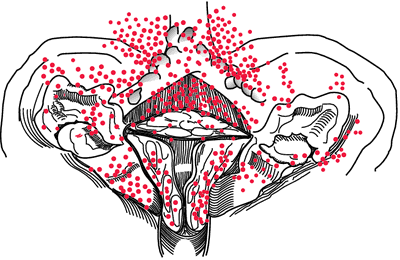peritonitis
[per″i-to-ni´tis]inflammation of the peritoneum. 
Acute Peritonitis. Acute peritonitis may be produced by inflammation of abdominal organs, by irritating substances from a perforated gallbladder or gastric ulcer, by rupture of a cyst, or by irritation from blood, as in cases of internal bleeding.
Symptoms and Diagnosis. Immediate and intense pain is felt at the site of infection, followed usually by fever, vomiting, and extreme weakness. The abdomen becomes rigid and sensitive to the touch. The patient may suffer mental confusion, fever, prostration, or shock. Although antibiotics have greatly reduced the mortality rate of acute peritonitis, the infection should be treated and controlled immediately; it can be fatal if neglected.
Diagnosis is based on manual examination, x-ray films, and blood tests.
Diagnosis is based on manual examination, x-ray films, and blood tests.
Treatment. The basic treatment for acute peritonitis is a combination of surgery, antibiotics, and other measures. The peritoneal cavity often must be opened and the toxic material removed. The original source of infection, such as an inflamed appendix, may have to be removed, or an abscess caused by the peritonitis may have to be drained. Antibiotics are used to fight the infection itself.
The patient usually takes nothing by mouth. Fluids are given intravenously. Narcotics and sedatives are often used to relieve pain and ensure rest. Treatment may also include blood transfusions and suction through a nasogastric tube to relieve abdominal pressure and to prevent accumulation of gas in the intestines.
The patient usually takes nothing by mouth. Fluids are given intravenously. Narcotics and sedatives are often used to relieve pain and ensure rest. Treatment may also include blood transfusions and suction through a nasogastric tube to relieve abdominal pressure and to prevent accumulation of gas in the intestines.
Chronic Peritonitis. The chronic form of this disease is comparatively rare, and is often associated with tuberculosis. Less frequently it may result from longstanding irritation caused by the presence in the abdomen of a foreign body such as gunshot.
In general, symptoms of chronic peritonitis are milder than those of acute peritonitis. Symptoms of tuberculous peritonitis are abdominal pain, low-grade fever, constipation, and general ill health, including loss of weight and appetite. Treatment depends on the underlying cause and the severity of the condition.
In general, symptoms of chronic peritonitis are milder than those of acute peritonitis. Symptoms of tuberculous peritonitis are abdominal pain, low-grade fever, constipation, and general ill health, including loss of weight and appetite. Treatment depends on the underlying cause and the severity of the condition.

Peritonitis. Infection spreads via lymphatics to peritoneum; formation of a pelvic abscess may occur. From McKinney et al., 2000.
adhesive peritonitis peritonitis characterized by adhesions between adjacent serous structures.
bile peritonitis (biliary peritonitis) that due to the presence of bile in the peritoneum; choleperitoneum.
gas peritonitis peritonitis with the accumulation of gas in the peritoneum.
septic peritonitis peritonitis caused by a pyogenic microorganism.
silent peritonitis asymptomatic peritonitis.
Miller-Keane Encyclopedia and Dictionary of Medicine, Nursing, and Allied Health, Seventh Edition. © 2003 by Saunders, an imprint of Elsevier, Inc. All rights reserved.
ad·he·sive per·i·to·ni·tis
a form of peritonitis in which a fibrinous exudate occurs, matting together the intestines and various other organs.
Farlex Partner Medical Dictionary © Farlex 2012
ad·he·sive per·i·to·ni·tis
(ad-hē'siv per'i-tŏ-nī'tis)A form of peritonitis in which a fibrinous exudate occurs, matting together the intestines and various other organs.
Medical Dictionary for the Health Professions and Nursing © Farlex 2012